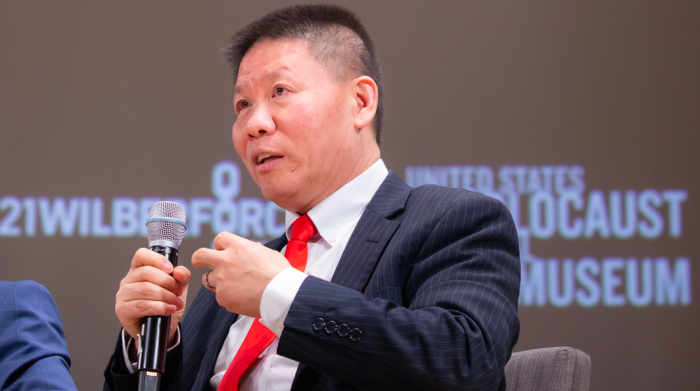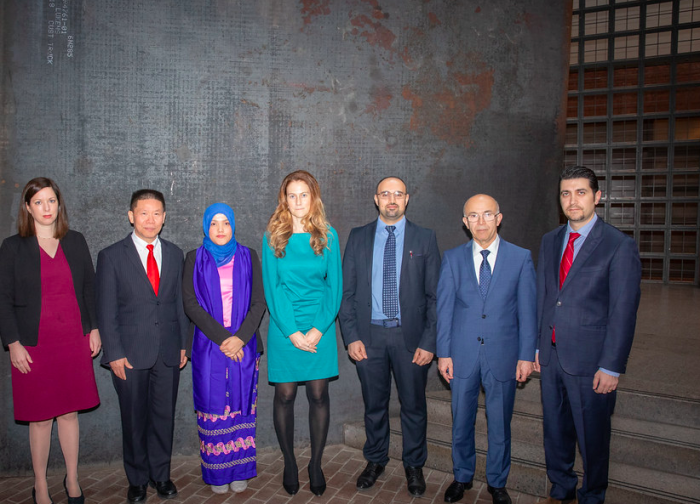China's President Xi is turning faith into 'tool for indoctrination of Communist ideology’

Representatives from five religious groups affected by severe religious persecution, including a Christian, Yazidi, and Uyghur Muslim, identified the most pressing issues facing their communities and shared how the international community can help.
During the National Prayer Breakfast sideline event on religious persecution around the globe co-hosted by the Holocaust Museum in Washington, D.C. and 21Wilberforce, moderator Naomi Kikoler, director of the Simon-Skjodt Center for the Prevention of Genocide, interviewed five host representatives from communities affected by religious persecution.
The panel included Yasmin Ullah, president of Rohingya Human Rights Network; Nawaf Ashur, representing the Free Yazidi Foundation; Loay Mikhael, head of foreign relations for the Chaldean Syriac Assyrian Popular Council; Omer Kanat, executive director of the Uyghur Human Rights Project, and Bob Fu, the founder and president of China Aid.
Kikoler noted that much of the persecution facing groups around the world is the result of years of ignored warning signs. The obligation of world leaders today is to recognize these warning signs and “act before it’s too late,” she said.
The panelists then identified risks facing their individual communities right now.
Fu, a Christian, applauded the panel for bringing different religions together, emphasizing that “one faith community cannot fight this battle alone.”
He said that over the last two years, Chinese President Xi Jinping’s “war on religion” has reached its “worst” in 40 years. He accused Xi of turning faith into a “tool for the indoctrination of Communist ideology.”
For example, all religious leaders must pledge to obey the Communist Party’s ideology in their pulpit before they can be allowed to practice their religion, Fu said. Additionally, millions of Chinese Christian children have been forced to renounce their faith by signing a Communist Party prepared document.
“Clearly the aim is to exterminate any independent faiths,” he said, referencing not only the Christian faith, but the faith of Muslims, Buddhists, and others.
“This is a very, very serious signal,” he said.
Fu also addressed the persecution experienced by members of China’s Early Rain Covenant Church, revealing that in addition to constant surveillance, at least 80 believers experienced “tremendous torture and trauma.”
“The camera recorded their false confession against their own pastor, Wang Yi, who was sentenced to nine years imprisonment,” he said. “After these false confessions, many were traumatized. They feel guilty of betraying the pastor. Some showed suicidal tendencies.”

Ullah spoke on behalf of the Rohingya community, an ethnic and religious minority group that exists in Myanmar (formerly Burma) and has been the victim of state-sponsored persecution. Close to a million people have been displaced or killed as a result of systematic persecution.
“We are seeing more and more of the element of re-traumatization within the community,” she said. “A lot of my people are living in a very restrictive condition inside one of the largest refugee camps in the world. Imagine having to eat rice once a day, every day. What do you think that would do to your body? Imagine young children fearing going to sleep because they fear that small rats would come and eat away at the tip of their fingers.”
“It eats away at your psyche and it eats away at your hope of being able to live a better life,” she added. “When we don’t try to resolve it in a more urgent manner, this is what it does to human beings and we’re going to have to brace for generations of Rohingya to come that are going to be completely traumatized.”
Ashur revealed that for the Yazidi community living in Iraq, there hasn’t been much “positive development” when it comes to safety and security.
“ISIS perpetrators who have committed genocide against Yazidis, they’re still living in much of Nineveh province,” he said, adding that tens of thousands of Yazidis remain displaced.
“We have a whole generation of traumatized people,” he said, adding that those who have survived the Islamic State's persecution are “severely traumatized” by what they endured.
“People have lost their entire families,” he said.
Ashur said that the relief efforts carried out by both the U.S. and Iraqi governments “haven’t translated on the ground,” adding that the continued instability in Iraq prompts the Yazidi people to fear another genocide might soon happen or another iteration of IS will appear.
Mikhael added that the persecution facing Christians and other minorities in Iraq is “unprecedented.” He explained that because of persecution at the hands of IS, the Christian population in Iraq dwindled from 1.5 million to just 250,000. He revealed his own family was forced to relocate “all over the world” due to persecution.
“We are all over the world,” he said, “not because of our choice, but because we were forced to flee. The challenge is tremendous.”
After IS was driven out of Iraq, Christians hoped that life would return to normal and be “prosperous” once again, Mikhael said. Yet, thousands remain displaced, jobless and traumatized with “life taken from them in the presence of the international community.”
Mikhael criticized the Iraqi government for its inaction, explaining that no official has tried to “do something tangibly on the ground to bring those communities back to their lives.”
“It’s really unspeakable,” he said. “I believe, to restore the dignity, you need to create jobs, you need to improve security, you need to have a well do to that.”
He urged the international community to make efforts to improve life for Christians, Yazidis, and other minorities in their home countries instead of accepting thousands of refugees every year.
“People want to stay,” he stressed. “Nobody wants to leave.”
Kanat opened up about the risks facing Uyghur Muslims in China.
“The persecution of the Uyghurs by the Chinese authorities has been going on for several decades,” he said. “But in 2017, it turned into all war against the Uyghur religion, culture, and family life. The Chinese government is carrying out a campaign to exterminate Uyghur identity.”
About three million people — most of them from the Uyghur community — are thought to have been detained in China’s secretive “re-education camps” without trial. According to Kanat, it’s the largest incarceration of a religious group since the end of World War II.
In these prisons, people are forced to renounce their religion, culture, and identity, he said, adding that the worst is “yet to come,” as mass murder and genocide are “impossible outcomes.”
When asked how the international community can better serve those persecuted and prevent further oppression from occurring, Ullah said that the U.S. has an obligation to signal to other countries the importance of treating every human with worth and dignity.
“Learn the stories of the survivors, learn to speak to them if you have access to one,” she advised listeners. “Make them feel that you respect them as humans. That is the fundamental right … that we owe to each other.”
Fu encouraged the international community to “pay attention to the truth” and “spread true information about faith communities and persecution” on social media.
He also stressed that faith communities must unite and speak with “one voice and for each other.”
“That is a powerful message,” Fu said.





























